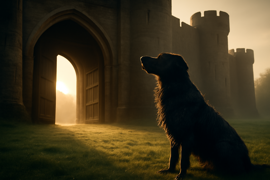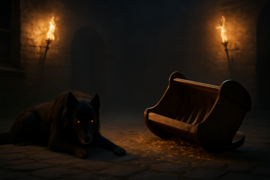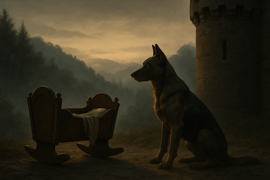Introduction
Beneath the gray Welsh sky, the ancient stones of Dolwyddelan Castle stand sentinel over a silent valley dotted with sheepfolds and wind-beaten pines. It was here, high on a rocky ridge, that Prince Llywelyn the Great bestowed his trust on a noble hound named Gelert. The dog’s sable coat gleamed like softened obsidian in the first flush of dawn as Llywelyn prepared for a hunting expedition. The promise of boar and the thrill of the chase beckoned, but before he mounted his steed, the prince paused at the cradle where his infant son lay swaddled in wool and flax. Gelert, the steadfast companion, nosed the air and uttered a low, protective growl. Confident in the hound’s vigilance, Llywelyn kissed his sleeping heir and strode away, assured that Gelert would keep watch.
For days, the wind carried each echo of the hound’s bark through the valley, blending with the bleating of sheep and the distant tolling of the castle bell. By night, the moon cast a silver glow upon the stone walls, and Gelert paced the courtyard, ears alert and muscles coiled like springs. The people of the village who tended the flocks often whispered in awe of the dog’s devotion. Mothers hushed crying babes by telling how Gelert had once driven off a prowling wolf from the sheepfold, his jaws snapping shut just inches from the ravenous predator’s throat. This singular act of courage became legend, spreading beyond the crags and fir woods into the halls of neighboring kingdoms.
Yet loyalty can bear a heavy shadow. On the evening of the prince’s return, a hush fell across the fortress—an unnatural stillness that stirred the hound into low growls and tense prowlings. The hearths were dim, and the air smelled of damp earth and lost promise. As the last crimson rays of sunset slipped beyond the hills, the tragedy that would render Gelert immortal was about to unfold, shaping a story that lives on in the Welsh hills and in the hearts of all who believe in the unbreakable bond between man and dog.
The Loyal Sentinel
The dawn that greeted Llywelyn’s departure had been bright and clear, the wind brisk yet kind enough to carry the prince’s laughter across the courtyard. Gelert trotted alongside his master, the rhythmic clink of armor and the creak of saddle leather echoing through the castle walls. Yet as the hunting party vanished into the emerald thicket, the dog’s attention flickered back to the sound of soft snoring beneath the cradle. Each night thereafter, Gelert would slip from the great hall and pace the stone floor until the first rays of light filtered through the arrow slits. By the time the moon had completed its arc above the peaks, tales of the dog’s vigil had spread among the villagers. They claimed they could hear his low whine carried on the wind, a lament for the dark presence he sensed in the woodland beyond the fold.

Within the growing hush of dusk, the hound’s instincts sharpened. Wolves had been seen on the march down in the valley, their yellow eyes reflecting torchlight as they padded from pack to distant wood. Gelert would circle the perimeter, hackles raised, every sinew ready for the moment when flesh-hungry jaws might breach the flimsy palisade. On a night tinged by a blood-red moon, a shepherd’s distant cry rang out. Gelert sprinted through the opening with inhuman speed, scattering sheep like leaves before a gale. When he returned, the flock was safe, and the dog’s armor-stained muzzle and the scrap of torn hide in his teeth bore testament to his victory over a snarling invader.
Though the castle walls had kept out enemy armies, it was Gelert’s bravery that preserved the prince’s bloodline. Rumors spread that his bark warded away a dark spirit, a wraith of ancient Welsh myth sent to snatch the realm’s hope. Elders traveling the trade routes would tell of a phantom dog that roamed the barrows—until Gelert appeared, banishing terror with steel-sharp fangs. Children dared one another to touch the tip of the hound’s tail in the courtyard, believing that doing so might bring them courage in times of fear. To Llywelyn’s subjects, Gelert had become more than a guard: he was a living legend, a bond between mortal and myth that lent the prince’s rule a sacred certainty.
A Treasury of Terror
Llywelyn’s hunt had yielded little beyond bruised pride and an empty game bag, but as the prince rode home beneath a sky turning from violet to indigo, his thoughts were on the hearth’s warm glow and the babe awaiting his father’s blessing. Yet tranquility shattered at the threshold. Gelert, normally elated at his master’s return, snarled and bristled, retreating into the dark archway where torchlight failed. The prince called, and the hound answered with a snarl so fierce it echoed off the keep’s walls. Llywelyn stepped forward, hand reaching for the hilt of his sword, but found nothing—save the overturned cradle that wobbled on its rock-flagged stage.

Fear gripped Llywelyn’s heart as he knelt by the fallen cradle and saw the dark stain that coated its bedding. The child’s cries echoed from the nanny’s empty quarters, but the hound’s stance spoke of triumph: the jaws that once protected the defenseless now dripped with fresh blood, the throat torn asunder. In a frenzy of hatred and despair, the prince drew his sword and lunged at the creature he had trusted. Gelert, caught between devotion and fear, uttered a pained whine before the blade found its mark. His eyes, once bright with fidelity, dimmed as he collapsed at Llywelyn’s feet, a final breath mingled with regret.
Only then did the prince’s blood run cold with horror. From behind a curtain, the nanny appeared, cradling the prince’s son whose cheeks flushed with sleep, untouched by harm. In her trembling hands she held a tiny paw, manaedium smeared with crimson. Beside her lay the carcass of a wolf, hackles stiff and jaws snapped around nothing but spills of gore. Gelert had slain the predator and returned to safeguard the infant, his own life sacrificed by the misunderstanding of his master’s rage. Llywelyn fell to his knees, pressing the life that remained so close to the hound’s still warmth, sobbing for mercy that came too late. The night air carried his anguished cry across the courtyard and into the valley beyond, a lament that would echo through generations.
The Tragic Realization
Dawn brought neither comfort nor clarity, only the icy realization of irreversible grief. Llywelyn stood at the edge of the courtyard, gazing down at the hound’s motionless form. Blood had dried on his fur, and the once-proud beast lay as still as the stone underfoot. Beaten drums in the tower signaled the start of a new day, but in the prince’s heart there was only the ragged hush of remorse. He fell beside Gelert and wept, tears carving channels through the dust on his cheek. Around him, soldiers in mail paused, uncertain whether to offer solace or shield their prince from further pain.

form lies lifeless while Llywelyn collapses beside him, cloak billowing in the chill breeze."}
In the days that followed, the people whispered of the prince’s grief and the hound whose loyalty cost him life itself. It was said that the land wept with him: streams swelled with unexpected rains, fields of barley shivered under unsettled winds. Amid these omens, Llywelyn decreed a memorial stone be carved at the site where Gelert fell, its inscription a warning to any who might judge too swiftly. Villagers traveled from far-flung valleys to touch the base of the monument, seeking a blessing for their own beloved animals. They left tokens—bones of mutton, sprigs of heather, braided ribbons to honor the devotion that transcended death.
Generations later, a circle of standing stones marks the spot where the loyal hound was laid to rest, its carved likeness—the head of a noble dog forever vigilant—staring across the fields toward the forest edge. The ivy that clings to the monument’s face whispers of seasons passed and lives shaped by a single moment of misunderstanding. Travelers pause to tell the tale of Gelert, the faithful sentinel whose sacrifice reminds us that love demands patience, and that sometimes the greatest tragedy comes not from malice, but from mercy misdirected. Thus, the memory of Beth Gellert endures, a lesson etched in stone that loyalty, once broken, can never be fully restored.
Conclusion
Time has softened the edges of sorrow, yet the legend of Beth Gellert resonates as strongly today as it did in medieval Wales. Travelers weaving among the rolling hills of Gwynedd still pause beside the carved stone, its inscription a silent testament to the bond between a man and his hound. They touch the rough granite and whisper a prayer or lay a ribbon of woven wool, honoring a loyalty that transcended fear and misunderstanding.
In every glen and on every mountaintop, the story of Gelert endures—not merely as a cautionary tale of rash judgment, but as a timeless reminder that love is measured in moments of trust and compassion. When doubt creeps in, one must remember the hound who stood guard through night and storm, whose only crime was unyielding devotion. In this way, the spirit of Gelert lives on, calling us to cherish the faithful companions at our side, to listen more deeply before we condemn, and to honor the courage that beats quietly in every heart, human or hound alike. With every sunrise over the Welsh valleys, his memory stands vigilant, guiding the living toward a justice tempered by mercy and a loyalty that asks nothing in return but the warmth of our understanding and the grace of our forgiveness.
Beth Gellert’s tale glows in the soft light of dawn and the hush of twilight, a living legend carved in stone, echoing through the ages in the hearts of all who value true friendship and the gentle strength of unwavering loyalty.

















